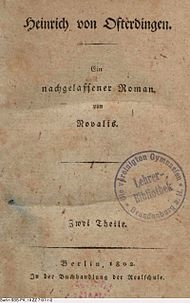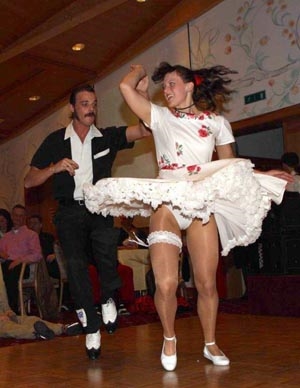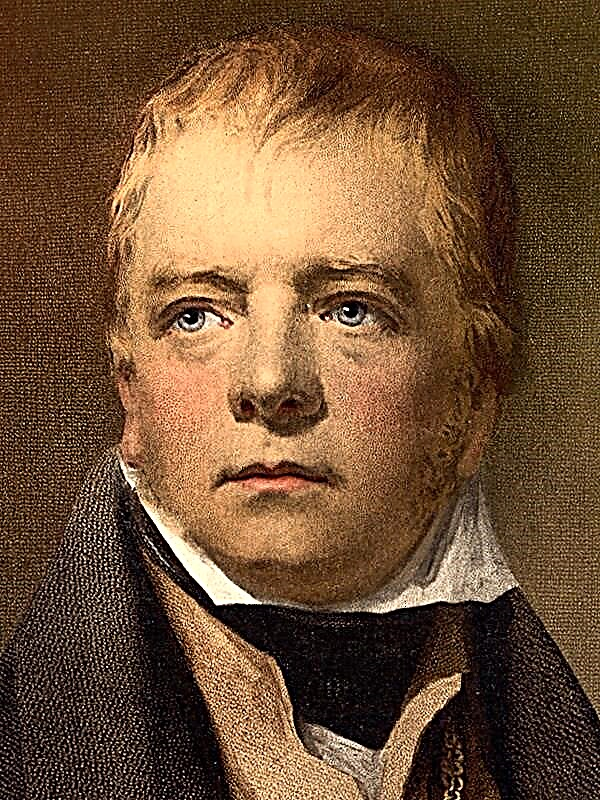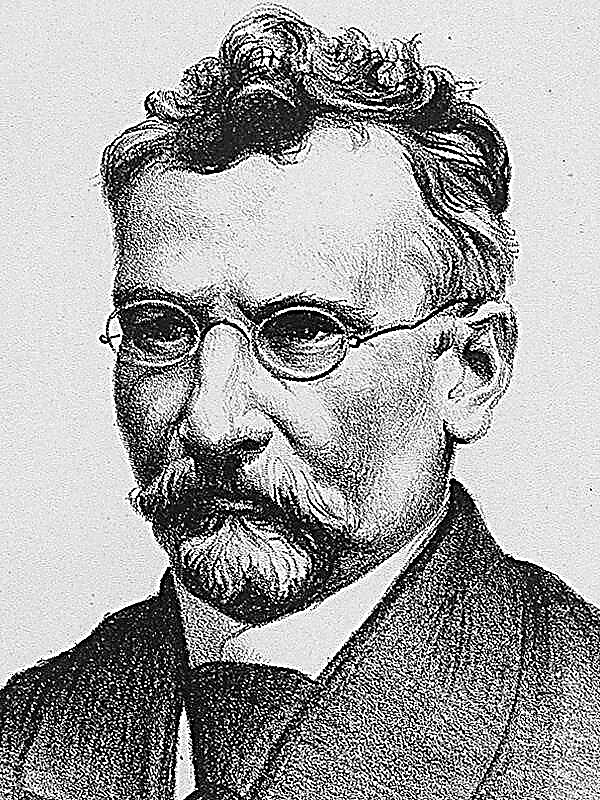General prologue
In spring, in April, when the earth wakes up from hibernation, swirls of pilgrims flock to all sides of England to Canterbury Abbey to bow to the relics of St. Thomas Becket. Once in the Tabard Tavern, in Sauerke, a rather motley company of pilgrims gathered, united by one thing: they all traveled to Canterbury. There were twenty-nine of them. During dinner, many of the guests had time to meet and talk. The guests were of various ranks and occupations, which, however, did not prevent them from maintaining a relaxed conversation. Among them was the Knight, known to the whole world for his valor and glorious feats that he accomplished in numerous battles, and his son, young Squire, despite his young years, who managed to earn the favor of his beloved, having earned himself fame as a faithful squire on long trips to strangers, dressed in a colorful outfit. Together with the knight, Yeomen also wore a green camisole with a hood and armed with a bow with long green feathers, a good shooter, apparently a forester. Along with them was an Abbess named Eglantin, who looked after the noble novices, meek and neat. Each of those sitting at the table was pleased to see her clean face and sweet smile. She was talking about something with the important and fat Monk, who was a monastery auditor. A passionate hunter and merry fellow, he was against strict, reclusive rules, loved to hang around and kept greyhounds. He was wearing a luxurious cloak, and he rode on a bay horse. Beside him sat Carmelit, a tax collector who excelled in his art like no one and knew how to squeeze the last penny even from a beggar, promising him eternal bliss in heaven. In a beaver hat, with a long beard, sat a wealthy Merchant, revered for his ability to save income and deftly calculate the rate. Interrupting hard work, riding on a frozen nag, a Student rode to Canterbury, wise books and spend the last money on them. A lawyer sat next to him, unsurpassed in knowledge of laws and in the ability to circumvent them. His wealth and fame quickly multiplied, as did the number of wealthy clients who often turned to the Lawyer for help. Nearby, in an expensive outfit, sat jolly Franklin, a former model sheriff and collecting fines. Franklin loved wine and a good table, which was famous in the area. Dyer, Ripper, Carpenter, Upholsterer and Weaver, dressed in solid outfits of the guild fraternity, did everything slowly, with a consciousness of their own dignity and wealth. They brought with them Cooks, jacks of all trades, so that he would cook for them during a long journey. The Skipper was sitting at the same table with them. He came from the western county and was dressed in a rough caftan of canvas. His appearance showed in him an experienced sailor from the Madelena, who knew all the currents and pitfalls encountered on the ship's way. In the crimson with a blue cloak, the Doctor of Medicine sat next to him, even London doctors could not compare with the art of healing. He was the smartest person, who had never once disgraced himself with sloppiness or recklessness. A Batska weaver chatted with him in a road coat and with a huge hat on her head. She was deaf, which did not prevent her from being a great craftswoman in weaving.
Having survived five husbands and no less number of lovers, she humbly went on a pilgrimage, was talkative and cheerful. Nearby at the table sat an modestly old Priest, better than whom the light could not see. He was an exemplary shepherd, helped the poor, was meek and merciful in dealing with the poor and mercilessly fair to the rich sinners. His brother. Plowman riding with him. He worked hard in the fields for his life and considered it a Christian's duty to obediently obey the commandments and help people who needed it. On the contrary, on the bench Melnik collapsed - a red-haired kid, healthy as a bull, with an impressive red beard and a wart, covered with stiff bristles, on his nose. A pugilist, womanizer, hunter and reveler, he was known as a desperate liar and thief. The house-keeper sitting next to him was successful in all the operations that he undertook, and was able to prettyly fool people. Mowed like a priest, in a blue cassock and on a horse in apples from Norfolk to Canterbury rode the Majordom. Being able to steal and flatter himself in time, he was richer than his master, he was stingy and well versed in his business. The bailiff of the church court swam all over with fat, and his small eyes looked at all extremely cunningly. No acid would have corroded the plaque of eternal dirt on his beard and drowned out the garlic burp, which he filled with wine. He knew how to be useful to sinners, if they paid, and carried with him instead of a shield a huge loaf of rye bread. Slavishly devoted to him, the seller of papal indulgences rode nearby. Lifeless strands of sparse, sticky hair fringed his forehead, he sang and taught in a squeaky voice from the pulpit and carried with him a box with indulgences, for sale of which it was wonderful.
Now, all of the above cheerfully sat at a table covered with all kinds of food and reinforced their strength. When the dinner was over and the guests began to disperse, the owner of the tavern stood up and, thanking the guests for the honor, drained his glass. Then, laughing, he noticed that travelers must sometimes be bored, and suggested to the pilgrims the following: everyone will have to tell a fictitious or true story during the long journey, and whoever tells the most interesting story will be gloriously treated on the return trip. As a judge, the Boss proposed himself, warning that anyone who starts to evade the story will be severely punished. The pilgrims happily agreed, for no one wanted to be bored, and the Boss liked everyone, even the most gloomy. And so, before setting off on the road, everyone began to draw lots, whom should they tell the first. The lot fell to the Knight, and the horsemen, surrounding him, prepared to listen carefully to the story.
Knight's Tale
The glorious lord Theseus ruled once in Athens. Glorifying himself with many victories, he finally captured Scythia, where the Amazons lived, and married their mistress Hippolyta. When he stood proudly in front of his capital, preparing to enter it to the sounds of fanfare, a procession of mourning women approached him. Theseus asked them what had happened, and was a little angry when he found out that they were the wives of eminent Theban warriors whose bodies were rotting under the sun, because the new ruler of Thebes, Creon, who had recently captured this city, did not allow them to be buried, leaving them to be torn to pieces by birds. Theseus mounted his horse and rushed off with his army to avenge the cruel Creon, leaving Hippolyta and her beautiful sister Emilia in Athens. The army besieged Thebes, the evil Creon fell in battle, defeated by Theseus, and justice was restored. Among the fallen soldiers of Theseus found two wounded heroes of noble family. Theseus ordered to send them to Athens and imprison them there in the tower, not agreeing to take a ransom for them. The young men were called Arsitus and Palamon. Several years have passed. Once beautiful Emilia walked in the garden, spread out next to the tower, where the poor prisoners languished, and sang, like a nightingale. At this time, Palamon looked into the garden from the barred window of the dungeon. Suddenly he saw the beautiful Emilia and almost lost consciousness, for he realized that he was in love. Woke up from this scream, Arsita thought his brother was sick. The Palamon explained to him what his sadness was, and Arsita decided to look at Emilia. Going to the loophole, he saw her walking between the rose bushes, and felt the same as the Palamon. Then a terrible contention and a fight broke out between them. One accused the other, each considered his indisputable right to love Emilia, and it is not known what the matter would have come to, if the brothers had not remembered their situation in time. Realizing that no matter how it turned around there, they still would never get out of prison, Arsita and Palamon decided to rely on fate.
Just at this time, a distinguished military leader Peritoy, a good friend of Bishop Theseus, arrived in Athens to visit. Previously, he was bound by the bonds of holy friendship with a young Arsita, and, learning that he was languishing in the tower, Peritoy tearfully asked Theseus to let him go. After hesitating, Theseus finally agreed, but with the indispensable condition that if Arsita again appears on Athenian soil, he will answer for it with his head. The unfortunate Arsita was forced to flee to Thebes, cursing his fate and envying Palamon, who remained in prison and could at least occasionally see Emilia. He did not know that at the same time the Palamon complained about him, confident that his brother, and not him, the poor prisoner, inherited happiness.
So flew a year or two. Once, when Arsita fell asleep in a restless dream, the god Mercury appeared to him and advised him not to despair, but to go try his luck in Athens. Waking up, Arsita threw back his doubts and fears and decided to dare to enter the capital, disguised as a poor man and took with him only a friend. The torment of his heart distorted his traits so much that no one could recognize him, and he was accepted into the service of the palace, calling himself Philostratus. He was so courteous and intelligent that the fame of a new servant reached the ears of Theseus, he brought Philostratus closer, making him his personal assistant and generously giving him. So Arsita lived at court, while his brother was already languishing for the seventh year in a tower. But somehow, on the night of the third of May, his friends helped him escape, and under the cover of darkness he hid in a grove several miles from the city. The Palamon had nothing to hope for, except to go to Thebes and beg his troops to gather an army and wage war on Theseus. He did not know that in the same grove, where he was waiting for the day, he jumped, going for a walk, Arsita. The Palamon heard Arsita complaining about his fate, extolling Emilia, and, unable to bear it, ran out into the clearing. Seeing each other, the brothers decided that only one could survive and have the right to the heart of the Queen's sister. Then the battle began that it seemed as if wild animals grappled in a mortal battle.
The noise of the battle attracted the attention of the glorious Theseus, who was driving past that grove with his retinue. When he saw the bloodied knights, he recognized them as a servant and an escaped prisoner and decided to punish them with death. After hearing their explanations, he already gave the order to kill the brothers, but, seeing tears in the eyes of Hippolyta and Emilia, touched by the unhappy love of two young men, the heart of the magnanimous monarch softened, and he ordered the knights to fight for the right to marry the beautiful Emilia here a year later, bringing with a hundred fighters each. There was no limit to the rejoicing of the two young men and the retinue of the magnanimous Theseus when they heard such a sentence.
Exactly one year later, a huge, richly decorated amphitheater was spread next to the grove, where a duel was to take place. On three sides of it were temples erected in honor of Mars, Venus and Diana. When the first warriors arrived, the amphitheater was already full. At the head of hundreds of knights, Palamont proudly marched along with the great Thracian military commander Lycurgus, On the other hand came the mighty Arsita. Next to him is the Indian Emetrius, a great ruler, and a little behind - a hundred strong, to match each other fighters. They offered prayers to the gods, each to his patron, Arsite to Mars, Palamon to Venus. The beautiful Emilia prayed to Diana that she would send to her husband the one who loves more. Through mysterious signs, everyone received confidence that the gods would not leave their wards in trouble. And so the contest began. According to the rules, the battle was supposed to continue as long as both commanders are inside the line bordering the lists. The defeated should have been led to milestones, which meant his defeat. Theseus gave a sign, and the crossed swords and spears rang. Blood flowed, wounded fell, those who got stronger rose, and no one could win. But then Palamona, who fought like a lion, was immediately surrounded by twenty soldiers, and the fierce Lycurgus could not help him. Palamon was seized by the hands, by the legs and carried outside the field, to the milestones. Here the battle was stopped ... Arsita emerged victorious, despite the efforts of the goddess of love Venus, who patronizes Palamon.
The joyful Arsita galloped galloping towards her lover, and suddenly a vile fury burst from under the hooves of his horse from the depths of hell. The horse fell to the ground with all its might, crushing his rider. The horror of the audience knew no bounds, a bloodied Arsit with a broken chest was urgently taken to Theseus' chambers, which tore his hair from grief.
Weeks pass, Arsite is getting worse and worse. Emilia finds no place for herself from longing and sadness, crying for days on end. Arsita's chest is full of pus, wounds sore. Feeling that he was dying, he called his bride and, kissing her, bequeathed to be a faithful wife to his brave brother, to whom he had forgiven everything, for he dearly loved him. After these words Arsita closed his eyes and his soul flew away.
The whole capital grieved for a long time, mourning the glorious warrior, Palamon and Emilia sobbed inconsolably for a long time, but time, as you know, quickly heals wounds. Arsita was buried in the very grove where they met with Palamon. Theseus, having burnt up, called on Palamon and said that, apparently, this was the order of the rock, before which man was powerless. Here they played the magnificent and cheerful wedding of Palamon and Emilia, who healed happily, loving each other with passion and devotion, honoring the order of the unfortunate Arsita.
On this, the Knight finished his story.
Miller's Story
Once a carpenter lived in Oxford. He was a jack of all trades and enjoyed a well-deserved reputation as a craftsman. He was rich and allowed freeloaders into his house. Among them, he lived a poor student who was well versed in alchemy, remembered the theorems and often surprised everyone with his knowledge. For his good disposition and friendliness, everyone called him Dusha Nicolae. Plotnikov's wife ordered a long life, and, having burnt, he married again the young black-browed beauty Alison. She was so attractive and sweet that there was no number in love with her, and among them, of course, was our student. Suspecting nothing, the old carpenter was still very jealous and looked after his young wife. Once, having arranged an innocent fuss with Alison, while the carpenter was not at home. Duc Nicolae, confessing her feelings, begged her to give him at least one kiss. Alison, who also liked a sweet student, promised to kiss him, but only when the opportunity presented itself. It was then that Dushka Nicholas decided to swindle the old carpenter. Meanwhile, according to Alison, the young church clerk Absalom also suffered. When he walked around the church, brandishing a censer, he looked only at Alison and sighed heavily. He was a dodger and a libertine and Alison did not like him at all, all her thoughts were turned to Nicholas.
Once, at night, unable to endure the yearning, Absalom picked up his guitar and decided to go to delight the beloved's ears with sad verses. Hearing this meow, the carpenter asked his wife what Absalom was doing under their fence, and she, despising the clerk, said that she was not afraid of such a thief. Dushka Nicholas on the love front things were much better. Having conspired with Alison, he took a supply of water and took it for several days and, having locked himself in his room, did not go out. Two days later, everyone was worried about where the student had gone and whether he was sick. The carpenter ordered to go ask him, but Nicolae did not open it to anyone. Here the kind carpenter was quite excited, for he heartily loved Duska Nicholas, and ordered to knock out the door. He saw Nicolas sitting on the bed, who, without moving, gazed steadily at the sky. The carpenter began to shake him violently to bring him to his senses, for he refused food and did not utter a single word. After a kind of shake-up, the student asked in an afterlife voice to leave him alone with the carpenter.When all this was done, Nicolas bent down to the carpenter’s ear and, taking from him a terrible oath of silence, said that on Monday (and it was Sunday) the world would face a terrible flood, similar to what it was under Noah. Guided by the Divine Providence, he, Nicolae, received the revelation of saving only three people - John the Carpenter, his wife Alison, and himself. In horror, the carpenter was momentarily speechless. The student ordered him to buy three large barrels or tubs and fix them on the rafters so that when the rain begins, it is convenient to float through a pre-prepared hole in the roof. Everyone had to crawl into the barrels separately, so that in such a terrible hour no one was tempted by the carnal temptation. Frightened to death, the carpenter, after listening to the student and firmly believing in his salvation, rushed off to buy tubs and snacks for a long voyage, without saying a word to anyone.
And then the fateful night came. The company quietly climbed into the barrels, and the carpenter began to pray earnestly, as ordered, awaiting a terrible rainfall, and soon fell asleep with a sound sleep. Then the lovers went down silently to spend the rest of the night in the Carpenter's bedroom. Meanwhile, the clerk Absalom, noting that the carpenter did not appear all day, and thinking that he was away, wandered off to try his luck under the windows of Alison. Having carefully prepared the speech, Absalom pressed himself to the window and began in a plaintive voice to beg Alison to give him at least one kiss. Then the carpenter’s wife, lying in the arms of a student, decided to play a joke on him. Opening the window and turning her ass, she put it in front of the culprit, and he, not understanding in the dark, kissed her, was horrified and, in addition, got a frame on the head. Hearing the sonorous laugh of Duska Nicholas, Absalom decided to take revenge on the lovers. Wiping his lips along the way, he rushed to the blacksmith, taking a red-hot opener from him. The blacksmith Gervaise did not dare refuse, and now Absalom is again at the window, with a hot opener in his hand, praying Alison to look out one more time. Then Nicolae decided to joke, leaned out of the window and farted deafeningly straight at Absalom’s nose. He was just waiting for this, stamping Nicholas’s ass with the opener so that his skin got off. Duc Nicolae howled in pain and screamed: “Water, rather water ...” The carpenter who woke up from this scream thought that the flood had already begun, cut the rope on which the barrel hung, and ... crashed down with a deafening crash. The neighbors ran into the noise, Nicolae and Alison came running. Everyone laughed until you drop over the poor old man who was waiting for the end of the world and paid for it with his broken leg. This is how the cunning schoolboy managed to trick the old carpenter and seduce his wife.
Doctor's Story
Titus of Libya narrates that once in Rome there lived a noble knight named Virginia, who earned universal love for his generosity. God awarded him his only daughter, who in her beauty resembled a goddess. When this story happened, the girl was already fifteen years old. She was beautiful, like a flower, wonderfully intelligent and pure in thoughts. There was no person who would not admire her, but she would not let insolent cavaliers and go to the merry feasts that her peers arranged.
Once, daughter Virginia went with her mother to the temple, where the girl was seen by a judge of the Appian district and insanely craved her. Knowing that she could not be approached, he decided to act by deception. He called on a guy named Claudius, an excellent villain, and, generously rewarding him, told him everything. Together they entered into a vile conspiracy, and if everything worked out as planned, Claudius expected a good reward. Anticipating a near victory, Appius sat in court a few days later when Claudius entered and said that he wanted to complain about a certain knight named Virginia, who had stolen a slave from him and is now passing her off as his daughter. The judge listened to him and said that without the presence of the defendant the court case could not be resolved. They called on Virginia, who, after hearing a false accusation, already wanted to besiege the liar, who claimed that he had witnesses, as befits a knight, but an impatient judge did not give him a word and passed a sentence according to which Virginia should give Claudia his “slave”. A stunned Virginia came home and told her daughter everything. Then he decided to kill her in order to avoid shame and abuse. His daughter, all in tears, asked only to give her time to mourn her life, to thank God for having delivered her from shame. Then Virginia took the sword, cut off his only daughter’s head and carried this bloody gift to the chamber, where the judge and Claudius were looking forward to it. They wanted to execute him there, but then the people burst into court and freed Virginia. A lascivious judge was imprisoned, where he committed suicide. His friend, Claudius, was forever banished from Rome.
Housekeeper's story about the raven
Once upon a time, the great god Phoebus, or else Apollo, lived among people. He was a handsome knight, cheerful and courageous, any enemy was afraid of his smashing arrows. Phoeb knew how to play the lyre, harp, lute peerlessly, and no one in the world possessed such a marvelous voice as his. By beauty and nobility, no one could compare with the great god. Phoebe lived in a spacious house, where in a beautiful room stood a golden cage. There was a crow. Now there are none of those; she was dazzlingly white and sang in a clear voice, like a nightingale. Phoebe loved her very much, taught her to speak, and soon the crow began to understand everything and imitate human voices exactly. In the same mansion lived the beautiful wife of Phoebe. He madly loved her, cherished her like a rare flower, gave expensive gifts and was jealous of her for anyone. He did not invite guests to his house, fearing that someone might seduce his wife, and kept her locked up like a bird in a golden cage. But everything is useless - the heart and all thoughts of his beloved wife belonged to another. Once, Phoebe absented for a long time, and the lover is right there. Together with Phoebe's beautiful wife, they quench their passion in a cage room. Crow saw all this and, loyal to his master, took offense for him. When Phoebe returned and went to the cage, the crow cried out: “U-stole! Stole! U-stole! ... ”Surprised by the strange change in voice of his favorite, Phoebe asked her what had happened. In rude, ominous words, the crow told him that while he was gone, the bastard lover dishonored the bed with his wife. In horror, Phoeb staggered back, fury swept over him, he took his bow and, pulling the bowstring to failure, killed his beloved wife.
After him, the worm of regrets began to swallow. He broke musical instruments, broke his bow and arrows, and in a fury attacked the raven, saying to her with contempt: “Lying creature, in vain I obeyed your libel, snake venom nourished your speech, for I killed my wife, who is innocent before me. Because of your slander, I forever lost my beloved wife and delight eyes. In punishment for your lies you will no longer be white as jasmine, but you will become black and ugly, you will no longer sing like a nightingale, but you will sinister ominously, foreshadowing the bad weather, and people will stop loving you. ” And the formidable god grabbed an envious bird, stripped off its snow-white feathers and threw a black monastic cassock on it, took away his speechlessness, and then threw him out into the street. Since then, all the crows are pitch black and croak loudly, lamenting at their distant ancestress. It is equally important for people to always weigh their words before saying anything so as not to share the sad fate of the white crow.












